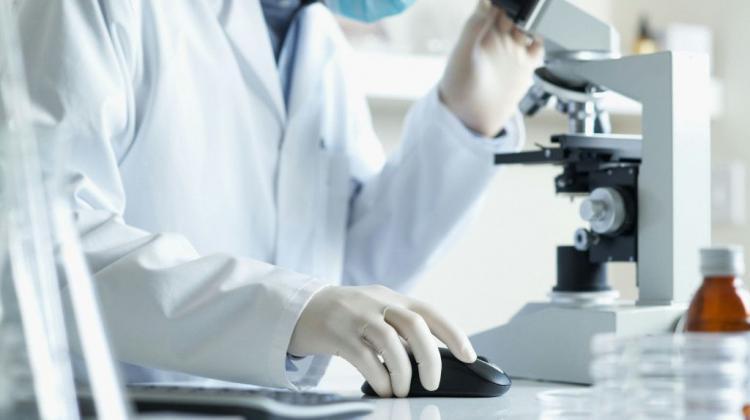Researchers use plant extracts, yeasts and fungi to "train" human immunity
 Photo: Fotolia
Photo: Fotolia
Researchers from the University of Lodz are looking for natural substances - plant, yeast and fungi extracts that can "train" the human immune system. The goal is that after another contact with a virus or a bacterium, the body should react faster, stronger and more effectively.
Among these substances are beta-glucans, whose regular intake improves the condition of innate immune cells - monocytes and macrophages - thanks to the use of a recently discovered mechanism called immune training, says Dr. Karolina Rudnicka from the Laboratory of Gastroimmunology at the Faculty of Biology and Environmental Protection at the University of Lodz.
"The result of our research is a new preparation that supports immunity in bacterial infections, primarily those caused by Helicobacter pylori" - he adds. This microorganism colonizes more than half of the human population. In some people, it causes inflammation of the stomach lining, ulcers or stomach cancer.
Dr. Rudnicka, an expert from the National Council of Dietary and Nutrition Supplements, reminds that human innate immunity is shaped and trained by its physiological flora and environmental microorganisms from the first days after birth, from the moment the child comes into contact with microorganisms present in the environment.
"The microorganisms or their components contained, for example, in protective vaccines, that our body comes into contact during the course of life, determine our immunity, its deficiencies or over-reactivity. We can also influence our immunity through regular exercise, sufficient amount of sleep, rest, diet, but also through the use of appropriate dietary supplements that will support it" - says Dr. Rudnicka.
Until recently, it was believed that the so-called immune memory is associated only with the mechanisms of adaptive (humoral) immunity. The best example of this phenomenon is a faster, more precise and more effective B-cell response to infection after vaccine antigens have been administered. It seemed that the evolutionarily older innate immune cells did not have the ability to react faster and remember how to react to repeated contact with the intruder.
But it turned out that certain bioactive agents of natural origin enhance this resistance by means of the recently discovered mechanism called immune training. Strengthening of immunity concerns NK (Natural Killer) cells responsible for the phenomenon of natural cytotoxicity, as well as granulocytes and monocytes that absorb and kill pathogenic microorganisms.
For several years, researchers from the Laboratory of Gastroimmunology at the University of Lodz have been cooperating with manufacturers and institutes involved in the production, search and study of natural substances that can enhance the body`s immune response.
"The immunostimulating agents that we study are highly purified natural components that have the ability to increase the activity of these cells, which help them remove microbes from our body more efficiently, protect us against infections, and also help regenerate the damage that accompanies the infection" - says the microbiologist.
Plant extracts are very good for such tasks. They include immunostimulants isolated from garlic, ginger rhizomes, large cranberry fruit, as well as thyme or oregano leaves.
"These plants contain a huge number of different active substances, particularly important of which are polysaccharides, sugar compounds that react directly with monocyte receptors, stimulating their activity" - explains Dr. Rudnicka.
Our resistance can also be strengthened with purified components isolated from microorganisms themselves. An example is beta-glucan - a compound belonging to the group of polysaccharides, which is part of the cell wall of fungi, plants and yeasts.
Studies show that yeast beta-glucans have the highest immunostimulatory potential. Administered in the form of purified preparation, they provide the strongest immune support, because their regular intake improves the condition of monocytes and macrophages.
"We have known for several years that this substance has the ability to train our immunity, and more specifically - train monocytes in such a way that after exposure to an infection they react faster and more efficiently. In addition, after this training they retain immune memory, which results in a stronger and faster elimination of pathogens during the next infection" - explains Dr. Rudnicka.
In her opinion, the use of bacterial components can be a solution to the problem of excessively sterile conditions in which we now live. Limited contact with naturally occurring microorganisms may cause abnormalities in the development and functioning of the immune system, especially innate immunity.
"Therefore, using natural components we can control the cells of innate immunity, and even eliminate the negative effect of excessive sterility" - she adds.
The result of the research of Łódź scientists is a new preparation that will be marketed. It supports immune response in bacterial infections, especially in the case of Helicobacter pylori infections. In addition to probiotics supporting the work of the intestines, the preparation contains extracts from plants that are commonly found in Poland and show antimicrobial activity against H.pylori, as well as pro-regenerative properties against damaged gastric mucosa.
The scientists are now looking for other substances that will exhibit properties similar to beta-glucan.
According to Dr. Rudnicka, there may be a lot of them in the environment. But earlier, without knowledge of the mechanism of immune training, scientists were not aware that these components could be used to modulate the immune system for health-related purposes, for example to mute systemic inflammation associated with most civilization diseases (atherosclerosis, obesity, inflammatory bowel disease, etc.).
PAP - Science in Poland, Kamil Szubański
szu/ zan/ kap/
tr. RL
Przed dodaniem komentarza prosimy o zapoznanie z Regulaminem forum serwisu Nauka w Polsce.















